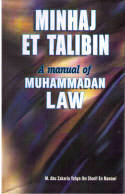Description
Minhaj et Talibin.
A manual of Muhammadan Law according to the school of Shafii,
By Imam Mahiudin Abu Zakaria Yahya Ibn Sharif en NAWAWI
Translated into English from the French edition of L. W. C. van den Berg
by E. C. Howard. Lahore (1977). (First Published in 1914 edition)
Hardback, Published in India, Pages:571
The Laws of Shariah according to the school (Madhab) of Imam Shafii. This book is suitable for a Muslim whether he or she is an ordinary householder, worshipper, a spouse concerned with marriage, divorce or maintenance, or an administrator of waqf, a testator, a trader, cultivator, joint stock holder. a lawyer, a judge, employer, employee, trustee, or a student of commerce, a donar of gift, a guardian.
Imported from Abroad so it is possible that the Cover could be slightly bruisd due to transportation etc
An Excerpt
BOOK 6._FASTING
CHAPTER 1._GENERAL PROVISIONS
SECTION 1 –
THE fast of the month of Ramadan becomes obligatory, i.e. commences, either upon the termination of the thirty days of the preceding month of Shaban, or from the first appearance of the new moon. The testimony of a single irreproachable witnessor of two, according to one authority is sufficient to establish the fact of this appearance. lf there be only one, he must unite all the requisites of an ocular and unexceptionable witness; so that the testimony of a slave or a woman cannot be accepted..
If the fast has been begun on the testimony of a single irreproachable individual, but the moon is not seen for the next thirty days, the fast must still be terminated after that period, even though the sky may have been cloudless. A sight f the moon in any place renders obligatory the commencement of the fast in that neighbourhood, but not in places situated at a great distance. By great distance is understood a distance which permits of the abridgment of prayer, or, according to others, a distance that causes an appreciable difference in the rising of the heavenly bodies. [The latter opinion is the better.]
When, by reason of the above rules, the fast is not yet obligatory in a certain place, a traveller, arriving from a place where the moon has already been seen, should conform to the local observance. And he should act in the same way on arrival at a. place where the moon has already been seen, coming from one where it has not yet been observed. But if in this way on arrival at a place he celebrates with the inhabitants the feast at the end of the fasting month, he must make up afterwards for the days fasting he has thus omitted. A passenger on a ship leaving on. the morning of the . feast and arriving the same day at a distant place where the inhabitants have not yet terminated the fast, should conform to the local observance during the rest of the day.




